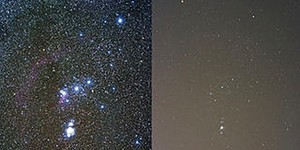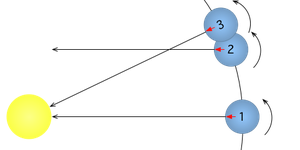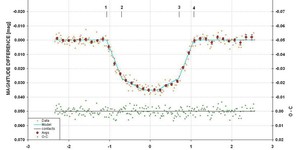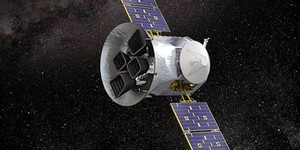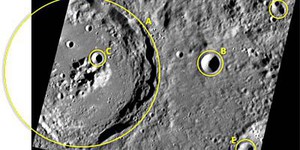Twelfth Grade, Astronomy Science Projects (8 results)
Astronomy is science that will challenge your imagination. How many stars in a galaxy? How many galaxies in the known universe? How many strange worlds are out there on other planets, orbiting other stars, and what are they like? Is there life on planets besides Earth? The distances are mind-boggling; the numbers are immense.
|
Select a resource
Sort by
|
This is a great project for someone interested in both stargazing and photography. Bright city lights and even the light of the full Moon obscure the dimmest stars, which can make identifying constellations more difficult. In this astronomy science project, you will calibrate a digital camera to measure the skyglow in different locations. This can be a great tool to comparing the quality of different star viewing locations.
Read more
Featured
Have you heard that garlic powder is supposed to inhibit the growth of bacteria? Which do you think would make a better disinfectant: a solution of garlic powder or a solution of bleach? This project shows you a straightforward way to compare the effectiveness of different disinfectants (or other antimicrobial agents), by measuring zones of inhibition on a culture plate.
Read more
Do you wake up at the crack of dawn, or do you need an alarm clock to wake you up each morning? It may surprise you that the two are not always in synch. Nowadays, we use Standard Time to set our watches instead of Solar Time. Which method of timekeeping is the most accurate? Get ready to synchronize your watches!
Timekeeping is the science of how to keep time with precision and accuracy. People have been finding ways of measuring time for thousands of years, usually based on the movements…
Read more
New
Artificial intelligence (AI) programs can now generate photorealistic pictures of people who do not exist in the real world. How can you tell if a picture is of a real person or a fake, AI-generated person? What features of the picture do people use to decide whether the face is real or AI-generated? In this project, you will explore these questions as you ask volunteers to look at both real and AI-generated pictures of human faces.
Read more
For an advanced science fair project, you can build your own telescope and learn how to use it to make observations of the night sky. Can you make your own observations to determine the orbital period of Jupiter's major moons?
The Dobsonian telescope, first built and popularized by astronomer John Dobson, is considered to be the best bang-for-your-buck if you want to build a good amateur telescope. The smaller the telescope's aperture the less expensive to build, but also the less…
Read more
The Kepler space telescope is a retired space telescope launched by NASA to discover Earth-size planets orbiting other stars. Named after astronomer Johannes Kepler, the spacecraft was launched on March 7, 2009, into an Earth-trailing heliocentric orbit. The principal investigator was William J. Borucki. After nine years of operation, the telescope's reaction control system fuel was depleted, and NASA announced its retirement on October 30, 2018.
Designed to survey a portion of Earth's region…
Read more
In astronomy, a transit (or astronomical transit) is a phenomenon when a celestial body passes directly between a larger body and the observer. As viewed from a particular vantage point, the transiting body appears to move across the face of the larger body, covering a small portion of it.
The word "transit" refers to cases where the nearer object appears smaller than the more distant object. Cases where the nearer object appears larger and completely hides the more distant object are known as…
Read more
New
If someone asks you to draw a picture of a doctor, lawyer, or engineer, what first pops into your mind? The race and gender of the person you imagine might be shaped by your personal life experiences, such as whether you have family members in those professions, or what representations of them you have seen on TV or online. What do you think will happen if you ask an artificial intelligence (AI) program to generate the picture instead? Will pictures generated by AI reflect the true real-world…
Read more
The Transiting Exoplanet Survey Satellite (TESS) is a space telescope for NASA's Explorers program, designed to search for exoplanets using the transit method in an area 400 times larger than that covered by the Kepler mission. It was launched on April 18, 2018 atop a Falcon 9 rocket. During its two-year primary mission, it was expected to find more than 20,000 transiting exoplanets, compared to about 3,800 exoplanets known when it launched. The first light image from TESS was taken on August…
Read more
Have you ever wanted to analyze data from a NASA spacecraft? In this science project you will use data from NASA's MESSENGER mission to measure the diameter and calculate the depth of impact craters on Mercury. You will then analyze that data for relationships between a crater's depth and diameter. This is your chance to
perform a science project as a NASA researcher would!
Read more
Let's suppose you can take advantage of the Internet and get a 'pen pal' located a 1000 miles away in another city. On the same night, and at EXACTLY the same time 'Universal Time', make a CAREFUL observation of where the Moon is located with respect to the background stars. You should be able to discern a slight (about 1/2 the Moon's diameter) shift in position due to parallax. Then, with a little geometry, you could estimate the distance of the Moon during the full lunar cycle (Odenwald,…
Read more
|
Explore Our Science Videos
Make a Thermometer - STEM Activity
How to Make a Homopolar Motor - Science Experiment
Extract Iron from Cereal– Science Project

